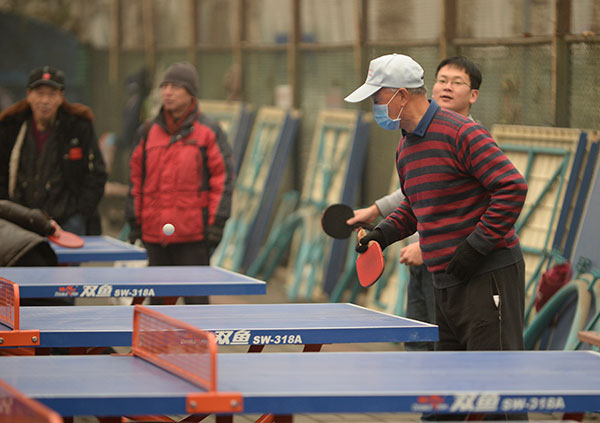More research sought on how dirty air can influence emotions

Mental health experts want more research done on how periods of serious pollution can cause "the smog blues."
Wang Jian, a veteran psychiatrist at Beijing Huilongguan Hospital specializing in mental health, said that an improved understanding of the relationship would help protect people from the potential mental health issues caused by serious air pollution.
According to him, some patients, primarily those with depression and neurosis, have seen their condition worsen after exposure to smoggy weather.
In response, he suggested that such patients remain indoors with the house well illuminated.
"The lights can be turned on even in daytime," he said.
But he pointed out that all people can be affected by "ecological pressures" like smog.
Tian Chenghua, a professor at the Institute for Psychiatric Research at Peking University's No 6 Hospital, said he didn't see any increase of patients during the recent smoggy days.
Also, bad pollution usually lasts two or three days, "which seldom leads to mental problems," he said.
China also lacks studies about the links between weather conditions and mental health.
Research conducted at Ohio State University in the US in 2011 found that long-term exposure to air pollution can cause changes in the brain that affect learning, memory and even happiness.
Conducted on rats, the study was reportedly the first of its kind.
A woman diagnosed with depression more than three years ago said that several days of heavy smog did affect her mood.
"It made me feel desperate sometimes on smoggy days. When the weather gets better, the sunshine heals me a lot," she said.
Tian said some depressed patients are highly susceptible to environmental factors, including smog, seasonal changes and a lack of sunlight.
He referred to the so-called winter blues, also called Seasonal Affective Disorder, that particularly affects people living in the Northern Hemisphere.
The problem is recognized by the academic world, with typical symptoms including depression, lack of energy, increased need for sleep, a craving for sweets and weight gain.
According to Tian, the condition is commonly seen in North Europe, but not so much in China.
Patients are given light therapy, which is mainly exposure to daylight or to specific wavelengths of light using equipment such as special lights, LEDs and lamps.




















































